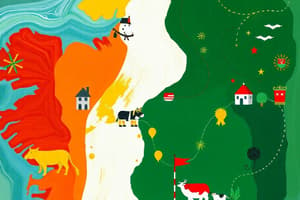Podcast
Questions and Answers
What is the significance of St. Patrick's Day in Ireland?
What is the significance of St. Patrick's Day in Ireland?
Easter is only observed as a cultural festival in Ireland.
Easter is only observed as a cultural festival in Ireland.
False
Name one traditional aspect of Irish culture.
Name one traditional aspect of Irish culture.
Irish music
Ireland has a strong emphasis on family and ______ ties.
Ireland has a strong emphasis on family and ______ ties.
Signup and view all the answers
Match the following holidays in Ireland to their descriptions:
Match the following holidays in Ireland to their descriptions:
Signup and view all the answers
Which of the following provinces is NOT one of the four provinces of Ireland?
Which of the following provinces is NOT one of the four provinces of Ireland?
Signup and view all the answers
The Viking Age had no significant influence on Irish culture.
The Viking Age had no significant influence on Irish culture.
Signup and view all the answers
What is the name of the head of government in Ireland?
What is the name of the head of government in Ireland?
Signup and view all the answers
The total area of Ireland is approximately ________ square kilometers.
The total area of Ireland is approximately ________ square kilometers.
Signup and view all the answers
Match the following historical events in Ireland with their significance:
Match the following historical events in Ireland with their significance:
Signup and view all the answers
Which mountain range is NOT a major geographical feature of Ireland?
Which mountain range is NOT a major geographical feature of Ireland?
Signup and view all the answers
Irish society is comprised solely of the Irish ethnic group.
Irish society is comprised solely of the Irish ethnic group.
Signup and view all the answers
Name one prominent Irish author known for their contribution to literature.
Name one prominent Irish author known for their contribution to literature.
Signup and view all the answers
Study Notes
Geography
- Ireland is an island situated in the North Atlantic Ocean off the western coast of continental Europe.
- It comprises the island of Ireland, encompassing a total area of approximately 70,280 square kilometers.
- The island is geographically subdivided into four provinces: Leinster, Munster, Ulster, and Connacht.
- Ireland features diverse landscapes, including mountains, coastal plains, and bogs.
- Major geographical features include the Wicklow Mountains, the Galtee Mountains, and the Burren.
- The island's climate is influenced by the North Atlantic Current and experiences relatively mild temperatures and a high degree of rainfall.
History
- Ireland has a rich and complex history, marked by various societal developments and historical periods.
- Prehistoric Ireland is characterized by evidence of early settlements and cultural practices.
- The arrival of Celtic peoples significantly influenced Irish culture.
- Irish Christianity, starting in the 5th century, played a substantial role in intellectual and cultural development.
- The Viking Age brought about interactions and influences, particularly in the north.
- The Norman invasion marked a pivotal turning point shaping both governance and society.
- The 16th and 17th centuries saw increasing English influence and conflict.
- The Act of Union in 1801 led to a political union of Ireland with Great Britain.
- The 20th century witnessed a struggle for Irish independence culminating in the establishment of the Irish Free State.
- Ireland's history is also characterized by periods of famine, emigration, and social upheaval including the Irish Potato Famine.
Political System
- Ireland functions as a parliamentary democracy with a president as head of state.
- The head of government is the Taoiseach (Prime Minister).
- The legislative branch is the Oireachtas, consisting of the Dáil Éireann (parliament), the Seanad Éireann (Senate), and the President.
- The executive power is vested in the government.
- Ireland's political system is strongly influenced by historical ties with the UK and the EU.
- The judicial system is based on common law traditions and has hierarchical structures, including the Supreme Court.
People and Culture
- Irish society comprises diverse ethnic and cultural groups.
- The predominant ethnic group is Irish, with a mix of historical lineages and influences.
- Ireland is known for its rich literary tradition, including prominent authors such as James Joyce and Oscar Wilde.
- Irish music, traditional dance forms, and folklore are integral aspects of the cultural heritage.
- The "Celtic" culture is an important aspect of Irish identity including traditions, music, and art.
- Ireland is a country with a strong emphasis on family and community ties.
- Irish traditions and values are deeply ingrained in the national psyche, and their influence can be seen in celebrations, customs, and social interactions.
Holidays
- Ireland celebrates various national and religious holidays.
- St. Patrick's Day is a significant public holiday celebrated annually.
- Easter is a cultural and religious festival.
- Christmas and New Year's Day are observed as significant holidays.
- Other public holidays include various commemorative dates.
- Religious holidays are widely observed.
- Bank holidays and commemorative days round out the calendar.
- Holidays are generally celebrated with festivities, cultural events, and community gatherings.
Studying That Suits You
Use AI to generate personalized quizzes and flashcards to suit your learning preferences.
Description
Explore the geographical features and historical developments of Ireland in this quiz. Learn about its provinces, significant landscapes, and the impact of various cultures throughout its rich history. Prepare to uncover fascinating facts about this unique island nation's past and environment.




